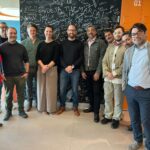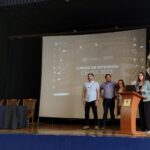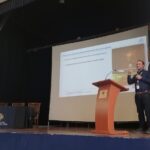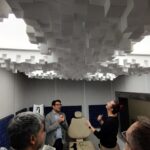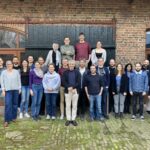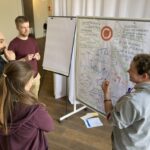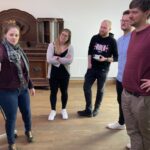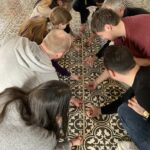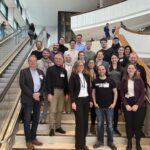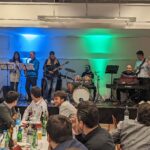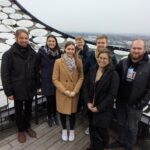Kategorie: ‘Hearing Technology and Acoustics’
Research trip to Santiago de Chile
From October 10th to October 13th 2023, Lukas Aspöck participated in the workshop “Digital transformation in the development of rehabilitation sciences: the current challenge to use state-of-the-art technology” on behalf of the Institute for Hearing Technology and Acoustics.
The workshop was held in Santiago de Chile and Valparaíso and was mainly hosted and organized by the Universidad San Sebastián. The program included many interesting presentations by national and international researchers related to machine learning, virtual reality and the development of sensors and tools which can be applied within different fields of rehabilitation and related research. As part of the workshop, the researchers also visited various facilities, ranging from laboratories and workshops for speech therapy and audiology to a healthcare unit for physical rehabilitation and the research and technology transfer center AC3E of the Federico Santa María Technical University.
- Visit at the AC3E research center, Valparaiso Photo: Sandra Rojas
- The organisation team of the event Photo: Lukas Aspöck
- Lukas during his presentation Photo: Rhoddy Viveros
- Speech lab in AC3E center in Valparaiso Photo: Lukas Aspöck
Lukas contributed to the event by giving a 60-minute presentation with the topic “Virtual reality environments for research in acoustics and audiology”. The slides of this presentation are available here.
Many thanks to our former colleague Rhoddy Viveros for the organization and the invitation to this event. Thanks also to the rest of the organization team, which was led by Carla Contreras and also included Sandra Rojas, Matías Zañartu and Cristhian Mendoza. The event was funded by the Chilean National Research and Development Agency (International Linkage FOVI220126).
1st IHTA Retreat
An interchange for good teamwork between researchers
On 28th and 29th March 2023, the scientific staff of IHTA was on a retreat at Gut Hohenholz near Bedburg in the Rhein Erft Kreis. During these two days, the institute’s past was reflected, and it was discussed how the future of the IHTA can be shaped together. Moreover, there was an intensive exchange among each other’s scientific work in the form of poster sessions. The researchers presented each other’s projects and revealed which milestones needed to be reached to achieve specific goals. Between poster sessions team spirit was strengthened, and the future of teaching and workflows were addressed. Furthermore, it was discussed how the skills of individual researchers could be maintained and passed on to new staff members.
Overall, it was two successful days with a lot of input for each individual and a lot of output for the group at IHTA.
A big thank you to Joachim Bellut, who guided us through the two days with his great moderation!
- Group photo at the IHTA Retreat (Foto: Joachim Bellut)
- Poster session (Foto: Joachim Bellut)
- Poster session (Foto: Joachim Bellut)
- Team building task (Foto: Joachim Bellut)
DAGA 2023 in Hamburg – 49th Annual Conference on Acoustics
The 49th Annual Conference on Acoustics DAGA took place from March 6th to March 9th 2023, in Hamburg. The IHTA was represented there with 22 presentations and seven posters. The researchers presented their work in eleven different subject areas. This shows the broad range of topics the Institute covers in hearing technology and acoustics.
During the conference, the technical committees of the Deutsche Gesellschaft für Akustik e.V. (DEGA) met. In the technical committee Hörtechnik (Hearing Acoustics) Professor Janina Fels handed over the chair position after six years. Besides, the technical group Junge DEGA selected Simon Kersten as its new chairman. Jonas Heck, who was elected as deputy, supports him in this position.
After the dinner at the social evening on Wednesday, the IHTA Band performed two songs from their repertoire. On Thursday, a small group took the opportunity to participate in an excursion to the Elbphilharmonie. Not only the grand hall was visited, but also the rooftop was climbed.
- IHTA group picture (Foto: Janina Fels)
- Performance of the IHTA Band at the social evening (Foto: Lara Stürenburg)
- On the roof of the Elbphilharmonie (Foto: Lara Stürenburg)
DAGA 2023 – 49. Jahrestagung für Akustik
Again, IHTA is joining DAGA in Hamburg with interesting contributions from March, 6th, to March, 8th, 2023. We are delighted to invite to our presentations and posters. In total, IHTA members will be represented with 27 contributions (22 presentations and 5 posters):
| Presentations | ||||
|---|---|---|---|---|
| Tuesday, March 7th | ||||
| Jonas Heck, Josep Llorca-Bofí, Aakriti Jain, Michael Vorländer |
Text mining of audio-visual descriptors for concert halls | Raumakustik 1 – Qualitätsfragen und Fallstudien A | 14:00 | Saal X 1-2 |
| Lukas Vollmer, Elisabeta Balla, Björn Kampa, Janina Fels | The Auditory Mismatch Negativity as an EEG-derived Measure of Predictive Coding | Psychoakustik | 14:20 | Saal X 7-8 |
| Lukas Aspöck, Michael Vorländer, Anne Heimes, Andreas Herweg, Olivier Dazel |
An online course about acoustic simulations and auralization | Lehre der Akustik | 15:00 | Saal Y 4 |
| Shaimaa Doma, Cosima Ermert, Janina Fels |
On the monaural contribution to HRTF discrimination | Perceptual Optimization of Dynamic Binaural Rendering 2 | 16:40 | Saal Y 9 |
| Lara Stürenburg, Hark Braren, Lukas Aspöck, Janina Fels | Akustische Vermessung einer Wärmepumpe für Hörexperimente und Simulationen | Strömungsakustik in der Energiewende | 17:20 | Saal X 9-10 |
| Wednesday, March 8th | ||||
| Marco Berzborn, Michael Vorländer | Analytic Model Based Analysis of Modal Sound Field Decay | Raumakustik 2 – Messung und Simulation A | 09:00 | Saal X 1-2 |
| Thomas Deutsch, Janina Fels | Evaluating Models for the Simulation of Cochlear Hearing Loss | Audiologische Akustik 3 – Charakterisierung des Hörsystems | 10:00 | Saal Y 5 |
| Pascal Palenda, Michael Kohnen, Michael Vorländer |
Influence of Position Mismatch on the Perception of Early Reflections of One’s Own Voice | Virtuelle Akustik 1 | 10:40 | Saal X 11-12 |
| Karin Loh, Edina Fintor, Sophie Nolden, Janina Fels | Comparing Children’s and Adults’ Intentional Switching of Auditory Selective Attention in Spatial and Noisy Acoustic Environments | Psychoakustik | 14:00 | Saal X 7-8 |
| Julia Seitz, Karin Loh, Sophie Nolden, Janina Fels | Investigating Intentional Switching of Spatial Auditory Selective Attention in an Experiment with Preschool Children | Psychoakustik | 14:20 | Saal X 7-8 |
| Hark Braren, Janina Fels | Individualized Head-related Transfer Functions for Children | Virtuelle Akustik 3 | 16:40 | Saal X 11-12 |
| Mark Müller-Giebeler, Michael Vorländer | Präzise Modellierung diffuser Schallfelder zur inversen Bestimmung akustischer Materialparameter | Raumakustik 2 – Messung und Simulation B | 17:40 | Saal X 1-2 |
| Anne Heimes, Michael Vorländer |
Measurement setup design for scattering patterns based on numerical simulations | Raumakustik 2 – Messung und Simulation B | 18:20 | Saal X 1-2 |
| Ingo Witew, Michael Vorländer | Wie genau müssen Messpositionen für reproduzierbare Klarheitsmaß Messungen definiert werden? | Raumakustik 2 – Messung und Simulation B | Saal X 1-2 | |
| Thursday, March 9th | ||||
| Chinthusa Mohanathasan, Jonathan Ehret, Cosima A. Ermert, Janina Fels, Torsten W. Kuhle, Sabine J. Schlittmeiers |
Towards More Realistic Listening Research in Virtual Environments: The Effect of Spatial Position of Two Talkers in Conversations on Memory and Listening Effort | SPP2236 – Auditory Cognition in Interactive Virtual Environments 1 | 09:20 | Saal Y 5 |
| Josep Llorca-Bofí, Jonas Heck, Michael Vorländer |
Reproducibility Exploration of Individual Vocabulary Profiles on Urban Soundscapes: Driescher Hof, Aachen | Soundscape | 09:40 | Saal X 5-6 |
| Cosima A. Ermert, Jonathan Ehret, Torsten W. Kuhlen, Chinthusa Mohanathasan, Sabine J. Schlittmeier, Janina Fels |
Audio-visual content mismatches in the serial recall paradigm | SPP2236 – Auditory Cognition in Interactive Virtual Environments 1 | 09:50 | Saal Y 5 |
| Chalotorn Möhlmann, Simon Kersten, Michael Vorländer |
Finite Element Simulation of the Occlusion Effect in the Ear Canal | Assisted Hearing – Testing, Models, Quality 1 | 10:00 | Saal X 11-12 |
| Lukas Aspöck, Stefan Morent, Michael Vorländer | Simulated reverberation for choir recordings in virtual churches | Raumakustik | 10:20 | Plenarsaal |
| Simon Kersten, Henning Taschke, Michael Vorländer | Fluid Motion and Pressure Distribution in the Human Inner Ear during Bone Conduction Hearing | Assisted Hearing – Testing, Models, Quality 1 | 10:20 | Saal X 11-12 |
| Carolin Breuer, Stephan Fremerey, Larissa Leist, Maria Klatte, Alexander Raake, Janina Fels |
Investigating the Influence of Visual Distractors on the Voluntary Switchtig of Auditory Selective Attention in Virtual Reality | SPP2236 – Auditory Cognition in Interactive Virtual Environments 1 | 10:40 | Saal Y 5 |
| Elie Abi Raad, Jose Maria Gomez Belmonte, Michael Vorländer |
Frequency response characterization of the welding process in Ultrasonic Metal Welding | Structure-borne sound | 16:00 | Saa Y6 |
| Poster | ||||
| Wednesday, March 8th | ||||
| Stefan Winkelmann, Lara Stürenburg, Isabel S. Schiller, Janina Fels, Sabine J. Schlittmeier |
Subjektiver akustischer Komfort von Luftdurchlässen für Gebäudelüftungen | Psychoakustik | 15:40-16:20 |
Foyer Z, Posterinsel H |
|
Marco Wegener, Jonas Heck, Josep Llorca-Bofí, Rouben Rehman, Christian Dreier, Philipp Schäfer, Michael Vorländer |
Introducing an Unreal Engine toolkit for audio-visual perception studies in the virtual lab IHTApark | Virtuelle Akustik (Late Poster) |
15:40-16:20 |
Foyer Z, Posterinsel Q |
| Thursday, March 9th | ||||
| Frederike Rust, Karin Loh, Lukas Aspöck, Janina Fels | Auswirkung akustischer Maßnahmen auf das Lärmempfinden im Klassenraum | Raumakustik (Late Poster) |
11:00-11:40 | Foyer Z, Posterinsel R |
| Jianliang Gao, Ingo Witew, Lukas Aspöck, Michael Vorländer, S. K. Tang | Global sound field estimation of a theatre using an efficient multi-channel room acoustic measurement system | Raumakustik (Late Poster) |
11:00-11:40 |
Foyer Z, Posterinsel R |
| Lili Pan, Jianliang Gao, Yuezhe Zhao | An optimized procedure for random-incidence scattering coefficient measurement in 1:10 scaled reverberation room | Raumakustik (Late Poster) |
11:00-11:40 |
Foyer Z, Posterinsel R |
An overview of all contributions and updated information can be found in the DAGA 2023 App.
We are looking forward to seeing you at DAGA 2023!
BASH 2021 – Joint Conference on Binaural and Spatial Hearing
The 2nd joint conference on binaural and spatial hearing (BASH) was held on October 7th and 8th, 2021. The meeting took place virtually, featuring talks on behavior, modeling, physiology and virtual reality. On Friday, October 8th, Janina Fels and Carolin Reimers gave a presentation on a paradigm investigating auditory selective attention in a virtual classroom, which has been developed in the context of the project “Evaluating cognitive performance in classroom scenarios using audiovisual virtual reality – ECoClass-VR” . This project is part of the priority program SPP2236 – AUDICTIVE: Auditory Cognition in interactive virtual Environments funded by the Deutsche Forschungsgemeinschaft (DFG) – German Research Foundation. Next to exciting projects, AUDICTIVE also organizes workshops for the participating researchers, such as a visualization workshop offered by Martina Grigoleit, which has already been made use of during the BASH.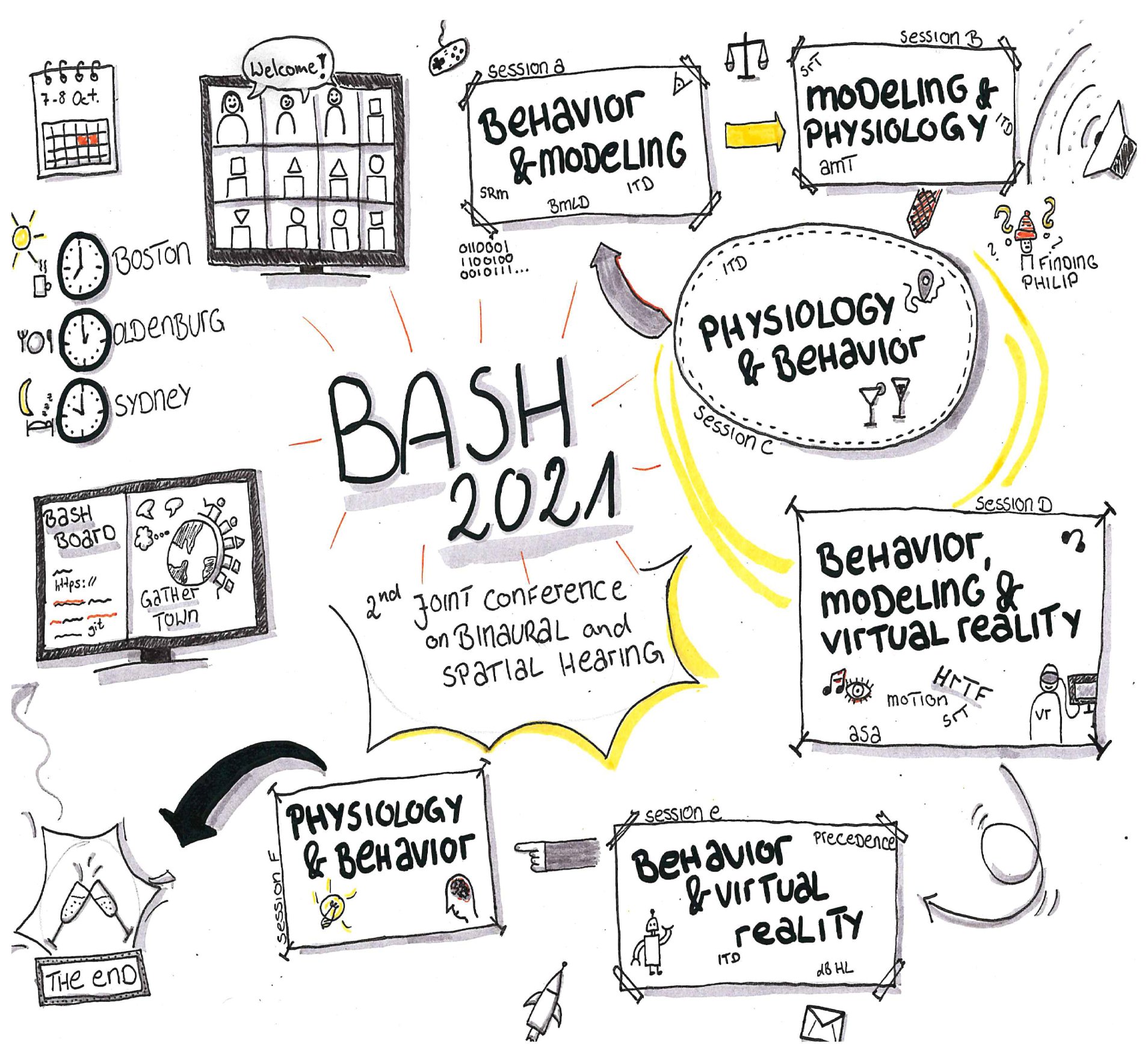
Annual Meeting of the Priority Program AUDICTIVE
On September 16th, 2021 we met online for our annual meeting of our priority program SPP2236 – AUDICTIVE (www.spp2236-audictive.de): Auditory Cognition in interactive virtual Environments funded by the Deutsche Forschungsgemeinschaft (DFG) – German Research Foundation.
The day was very inspiring and the basis for special interests groups and lab visits could be established! Special thanks go to our moderator Ellen Gürtler.
We are looking forward to the upcoming months full of exciting collaborations!
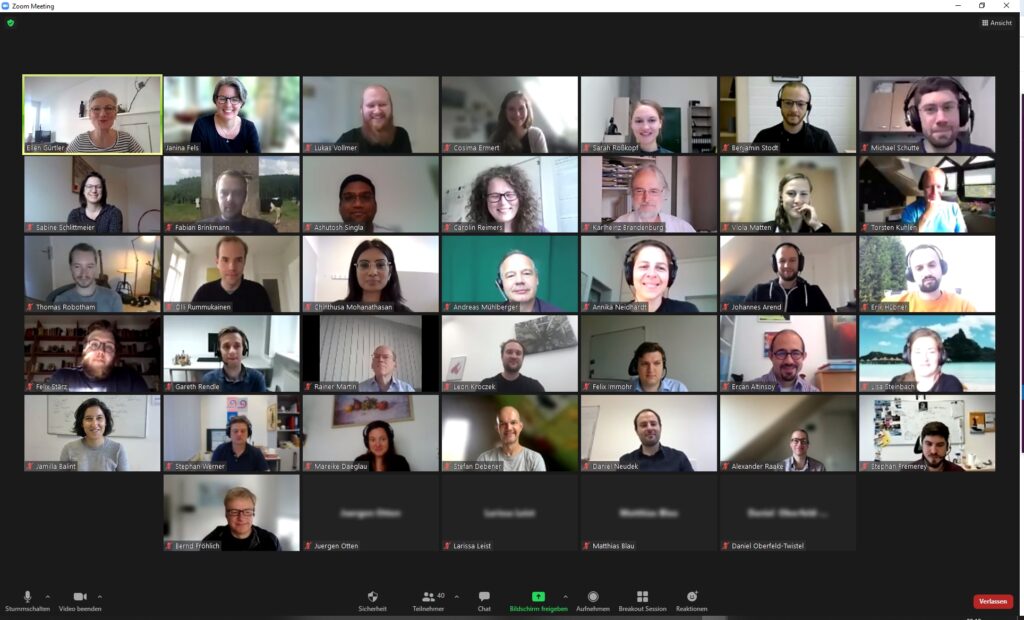
Screenshot of the Zoom Meeting
DAGA 2021 poster award
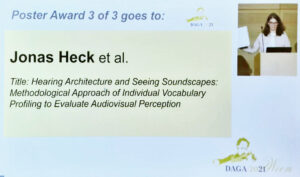 At the DAGA Acoustics Annual Conference 2021, one of the poster awards has been given to the work presented by Jonas Heck, Josep Llorca-Bofí and Michael Vorländer, with the title: Hearing Architecture and Seeing Soundscapes: Methodological Approach of Individual Vocabulary Profiling to Evaluate Audiovisual Perception.
At the DAGA Acoustics Annual Conference 2021, one of the poster awards has been given to the work presented by Jonas Heck, Josep Llorca-Bofí and Michael Vorländer, with the title: Hearing Architecture and Seeing Soundscapes: Methodological Approach of Individual Vocabulary Profiling to Evaluate Audiovisual Perception.
Congratulations!
New chairs for the EAA Young Acousticians Network (YAN) from IHTA
After many years of hard and fruitful work to maintain and to develop the products of European Acoustics Association, EAA Young Acousticians Network, YAN, Mathieu Gaborit is stepping back as the chair of the EAA YAN. In April this year, Elie Abi Raad has taken over the chair with Karin Loh as his co-chair. They will continue to evolve the community and presence of the YAN to provide an enriched network for young researchers within and beyond the European Acoustics Association (EAA).
We would like to thank Mathieu Gaborit and his team for the amazing work and congratulate Elie and Karin to their new challenges.
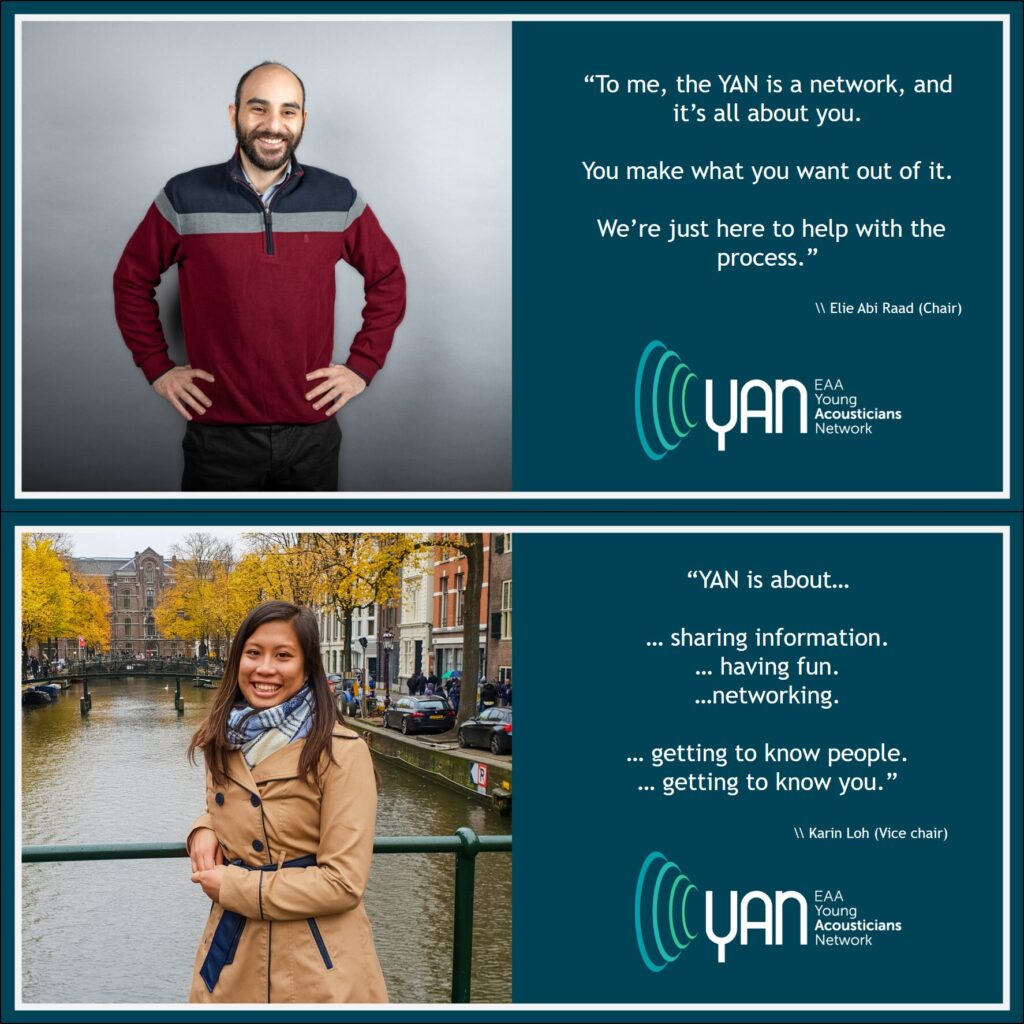
Priority Program AUDICTIVE – Kick-Off-Meeting
Awesome day (on April 27, 2021) with the virtual Kick-Off-Meeting from the priority program SPP2236-AUDICTIVE: Auditory Cognition in interactive virtual Environments funded by the German Research Foundation (DFG).
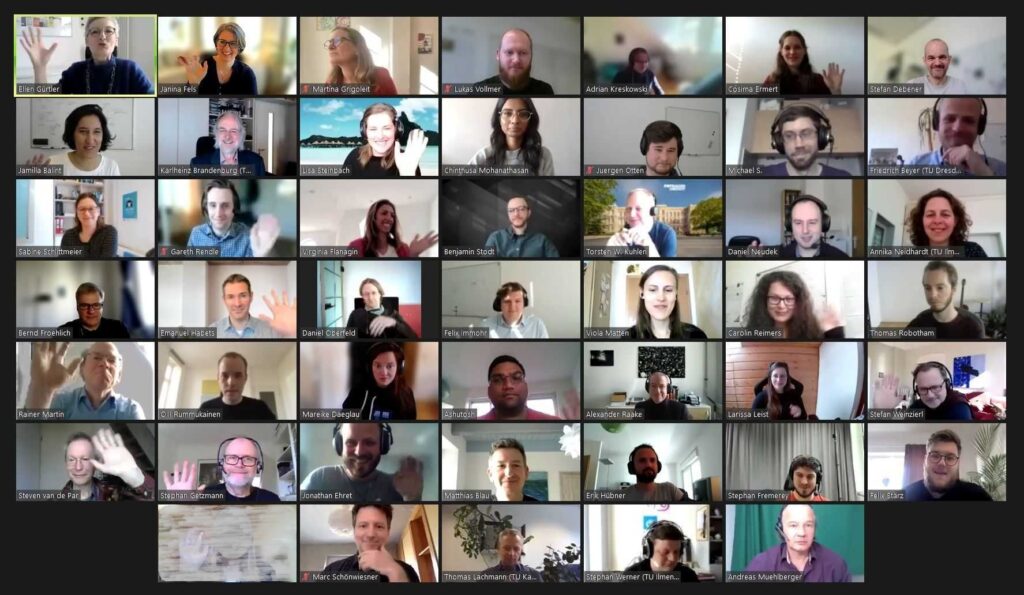
Group picture of the AUDICTIVE participants – Zoom
We are very happy that we had a very interactive and successful meeting with great collaborators and partners within AUDICTIVE. Special thanks go to our moderator Ellen Gürtler and the graphic recorder Martina Grigoleit, who made this day very inspiring and extraordinary.
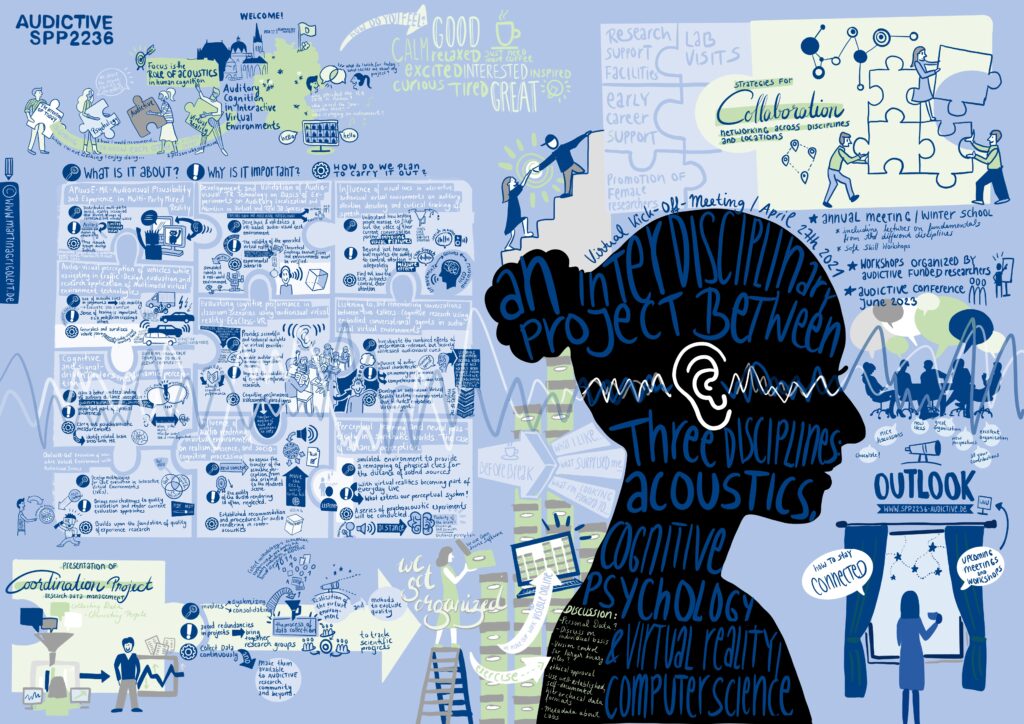
Graphic Recording of the Meeting by Martina Grigoleit
Brigitte-Gilles-Preis 2020
Die Initiative „Die interaktive Erlebniswelt der Akustik für große und kleine Kinder“ erhält den Brigitte-Gilles-Preis 2020 in der externen Kategorie. Koordiniert und betreut wird die Initiative vom Lehrstuhl für Hörtechnik und Akustik (IHTA).
In insgesamt vier Kategorien verlieh die RWTH Aachen den mit bis zu 2.500 Euro dotierten Brigitte-Gilles-Preis 2020. Er honoriert Projekte, Initiativen und eine Abschlussarbeit, welche die Bedingungen für Studium, Lehre und Forschung von Frauen an der Hochschule verbessern. Somit tragen sie dazu bei, die Zahl von Wissenschaftlerinnen und Studentinnen in Studiengängen mit geringem Frauenanteil zu erhöhen. (zur Pressemeldung der RWTH Aachen University)
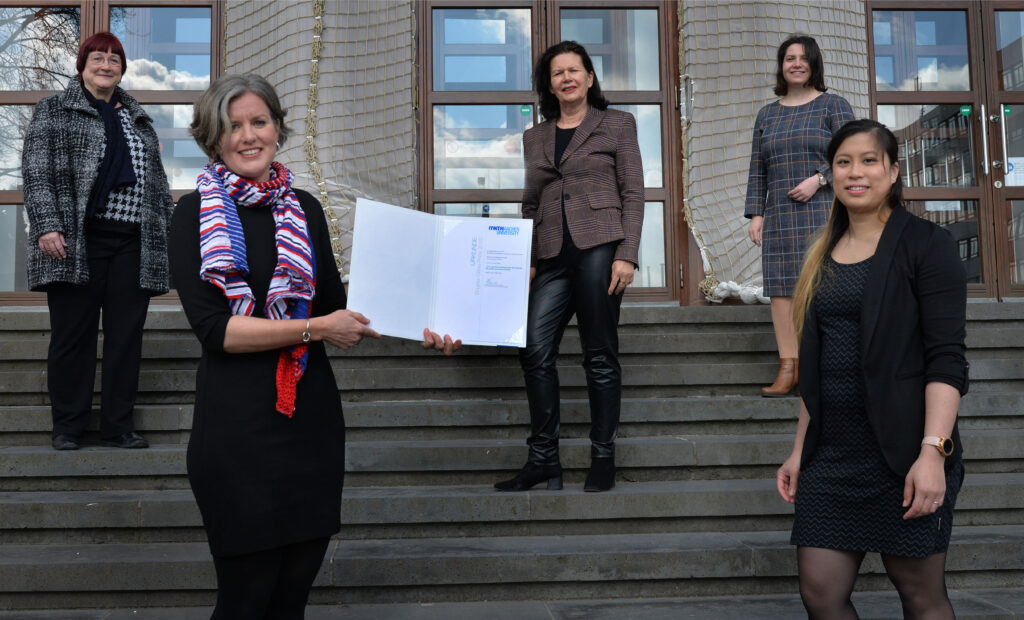
Professorin Doris Klee (Mitte), Prorektorin für Personal und wissenschaftlichen Nachwuchs an der RWTH, überreichte den Brigitte-Gilles-Preis 2020 an Karin Loh und Janina Fels. (Foto: Andreas Schmitter)
Die externe Kategorie würdigt Projekte, die das Interesse von Schülerinnen an Mathematik, Informatik, Naturwissenschaften und Technik – kurz MINT genannt – fördern. Die Auszeichnung erhielt in diesem Jahr die Initiative „Die interaktive Erlebniswelt der Akustik für große und kleine Kinder“. Hierbei wurden Konzepte entwickelt, die Mädchen zwischen drei und zwölf Jahren das spielerische und interaktive Erkunden und Erlernen des Hörens und der Akustik ermöglichen. Die Koordination und Betreuung erfolgt durch Karin Loh vom“ Lehrstuhl und Institut für Hörtechnik und Akustik “ und wird geleitet von Professorin Janina Fels. (zur Pressemeldung der RWTH Aachen University)
Das „female Network Melaten“ durfte den Brigitte-Gilles-Preis 2020 in der internen Kategorie entgegennehmen. Zudem wurde das Projekt „Hlumani – der Zukunft eine gerechte Chance geben“ mit einem Sonderpreis ausgezeichnet sowie Dr. Anna Stertz für ihre Abschlussarbeit.
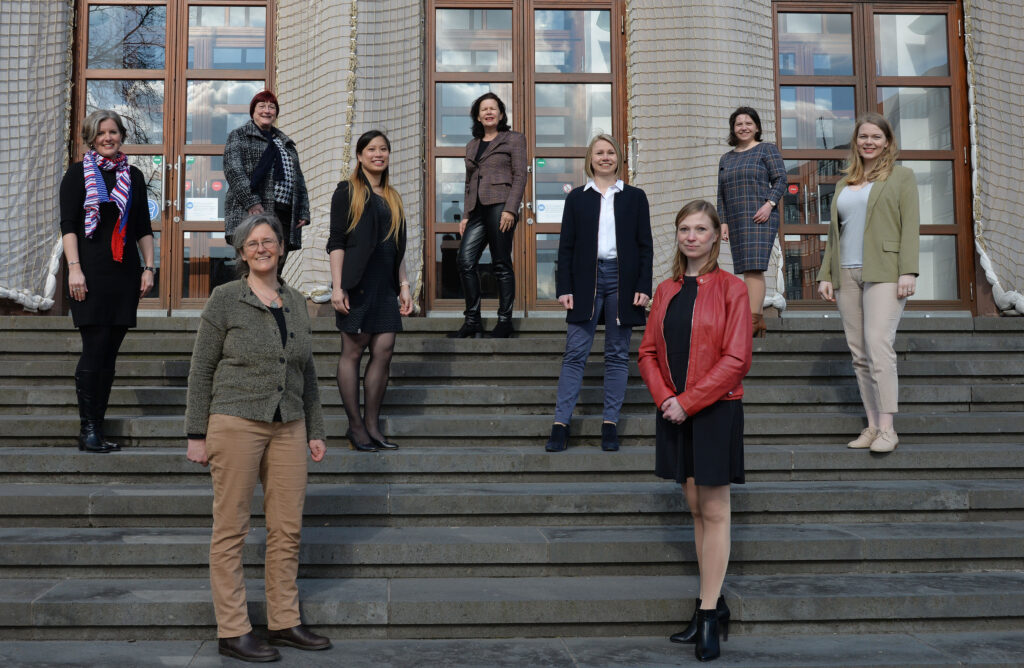
Professorin Doris Klee (hinten Mitte), Prorektorin für Personal und wissenschaftlichen Nachwuchs an der RWTH, überreichte die Brigitte-Gilles-Preise 2020. (Foto: Andreas Schmitter)
Das IHTA gratuliert allen Preisträgerinnen sehr herzlich!
New chairs and council members for the EAA TC on Psychological and Physiological Acoustics
During this year’s e-Forum Acusticum 2020, the EAA Technical Committee on Psychological and Physiological (TC P&P) Acoustics has elected their new (co-) chairs and council members for the next three years.
Univ.-Prof. Dr.-Ing Janina Fels, RWTH Aachen will take over the co-chair. The ITA team extends warm congratulations to Prof. Fels on her election!
The TC P&P (https://euracoustics.org/technical-committees/tc-on-psychological-and-physiological-acoustics) connects European-wide researchers of psychophysics and physiology of the auditory system, and modellers using an approach based on neural structures in the auditory system (i.e., use a systems approach).
The new elected members in the TC P&P are
- Piotr Majdak, Vienna (TC chair)
- Janina Fels, Aachen (TC co-chair)
- TC council members:
-
-
Sarah Verhulst, Ghent
-
Mathieu Lavandier, Lyon
-
Andre Fiebig, Berlin
-
Armin Taghipour, Luzern
-
Armin Kohlrausch, Eindhoven
-
W3 Lehrstuhl für Hörtechnik und Akustik
Am 13. November 2020 wurde von Rektor der RWTH, Prof. Dr. rer. nat. Ulrich Rüdiger, die Urkunde zur Ernennung als W3-Professorin an Prof. Dr.-Ing. Janina Fels überreicht. Damit wird das bisher von ihr geleitete Lehr- und Forschungsgebiet für Medizinische Akustik zum Lehrstuhl für Hörtechnik und Akustik (Chair for Hearing Technology and Acoustics).
Das gesamte Institut für Technische Akustik freut sich über diese Entwicklung und gratuliert sehr herzlich.
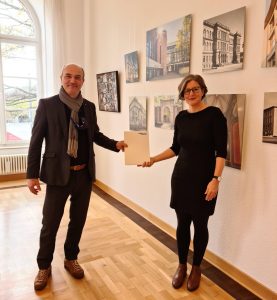
DFG bewilligt zehn interdisziplinäre Projekte im Schwerpunktprogramm AUDICTIVE
Im Oktober 2020 hat die DFG (Deutsche Forschungsgemeinschaft) zehn interdisziplinäre Projekte und das Koordinationsprojekt zur ersten Phase im Schwerpunktprogramm SPP2236 AUDICTIVE bewilligt.
Drei Projekte wurden mit der Beteiligung der Sprecherin Prof. Dr.-Ing. Janina Fels bewilligt:
- das Koordinationsprojekt, in dem der interdisziplinäre Austausch und das Forschungsdatenmanagement im Fokus stehen
- das Projekt „Listening to, and remembering conversations between two talkers: Cognitive research using embodied conversational agents in audiovisual virtual environments„, welches ein gemeinsamer Antrag mit Prof. Dr. Torsten W. Kuhlen und Prof. Dr. Sabine J. Schlittmeier von der RWTH Aachen University ist und
- das Projekt „Evaluating cognitive performance in classroom scenarios using audiovisual virtual reality – ECoClass-VR„, welches ein gemeinsamer Antrag mit Prof. Dr.-Ing. Alexander Raake, TU Ilmenau und apl. Prof. Dr. Maria Klatte, TU Kaiserslautern ist.
Eine Übersicht über alle Projekte kann auf der Projektwebseite zum Schwerpunktprogramm (http://www.spp2236-audictive.de) eingesehen werden.
Wir freuen uns auf die Zusammenarbeit im Schwerpunktprogramm AUDICTIVE.
Promotionsprüfung Josefa Oberem, M.Sc.
Am 24. Januar 2020 hat FrauJosefa Oberem, M.Sc, ihre mündliche Promotionsprüfung erfolgreich abgeschlossen.
Frau Oberem promovierte über das Thema:
„Examining auditory selective attention: From dichotic towards realistic environments“
Abstract:
The aim of the present thesis is to examine the cognitive control mechanisms underlying auditory selective attention by considering the influence of variables that increase the complexity of an auditory scene. Therefore, technical aspects such as dynamic binaural hearing, room acoustics and head movements as well as those that influence the efficiency of cognitive processing are taken into account. Step-wise a well-established dichotic-listening paradigm is extended into a “realistic” spatial listening paradigm.
Conducted empirical surveys are based on a dichotic-listening paradigm examining the intentional switching of auditory selective attention. Spoken phrases are simultaneously presented by two speakers to participants from two of eight azimuthal positions. The stimuli are phrases that consist of a single digit (1 to 9, excluding 5), in some experiments followed by either the German direction “UP” or “DOWN”. A visual cue indicates the target’s spatial position, prior to auditory stimulus onset. Afterwards, participants are asked to identify whether the target number is arithmetically smaller or greater than five and to categorize the direction. Reaction time and accuracy are performance measures. Differences of performance measures between the repetition of the target’s spatial position and the related switch (switch costs) describe the loss of efficiency associated with redirecting attention from one target’s location to another. To examine whether the irrelevant auditory information is decoded, interference in the processing of task-relevant and task-irrelevant information is created in the paradigm.
To study the binaural effects in the intentional switching of auditory selective attention, the dichotic-listening paradigm is gradually extended towards a binaural-listening paradigm representing complex dynamic acoustic scenes in the present thesis. In order to realize the extension of the paradigm towards a realistic scene various technical methods and tools need to be applied. As the listening paradigm is step-wise broadened towards realistic scenes the technical methods and tools are assessed with respect to the collected empirical results.
Using the binaural-listening paradigm, the ability to intentionally switch auditory selective attention is tested when applying different methods of spatial reproduction. Essential differences between real sources, an individual and a non-individual binaural synthesis reproduced with headphones as well as a binaural synthesis based on Cross-Talk Cancellation are found. This indicates how the loss of individual information reduces the ability to inhibit irrelevant information. Differences in performance measures occur also with regard to the target’s spatial position. Reliable findings on the spatial localization ability are confirmed applying the listening paradigm on the intentional switching of auditory selective attention. As a step towards multi-talker scenarios in realistic environments participants are tested in differently reverberating environments. Switch costs are highly affected by reverberation and the inhibition is also impaired by to be unattended information. Age-related effects are also found when applying the binaural-listening paradigm, indicating difficulties for elderly to suppress processing the distractor’s speech.
Das ITA gratuliert sehr herzlich!!
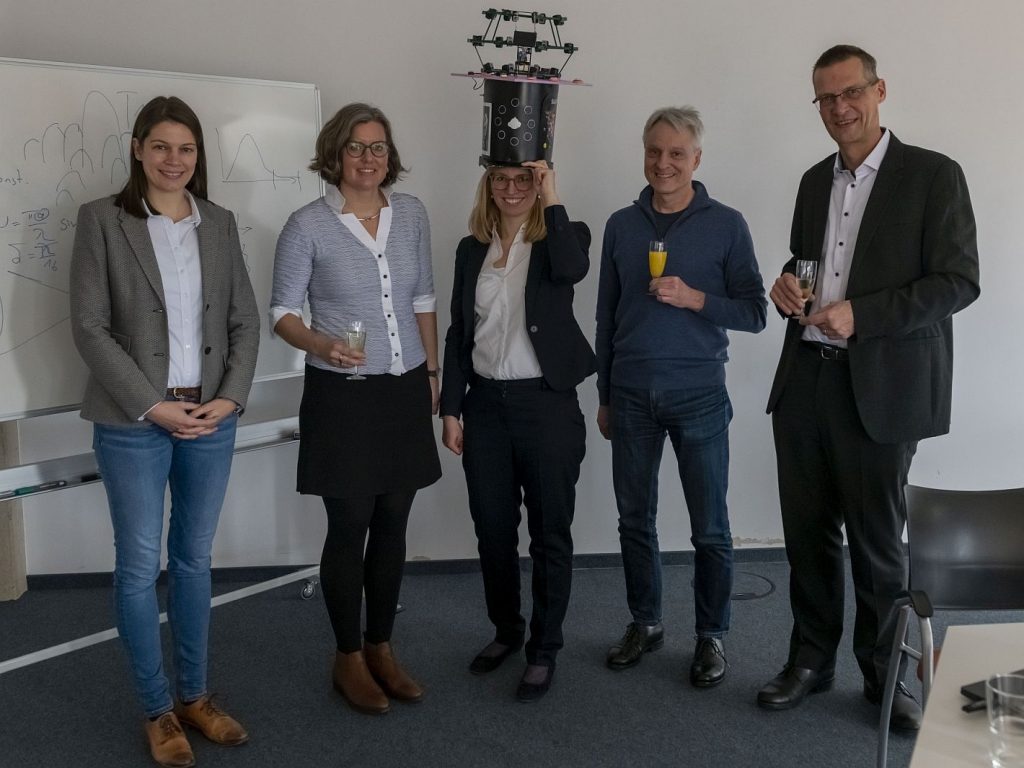
GfTA Studienpreise 2019 für Johannes Imort und Lukas Vollmer
Auf der gestrigen Weihnachtsfeier des ITA wurde von der Gesellschaft für Technische Akustik e.V. (GfTA) je ein Preis für eine herausragende Bachelorarbeit und eine herausragende Masterarbeit vergeben. Die Preisträger sind dieses Jahr Johannes Imort und Lukas Vollmer. Wir sagen natürlich herzlichen Glückwunsch!
- Johannes Imort, Bachelorarbeit zum Thema „The Directional Energy Decay Curve in Reverberation Rooms / Die richtungsabhängige Nachhallkurve in Hallräumen“ im Lehrstuhl für Technische Akustik betreut durch Marco Berzborn.
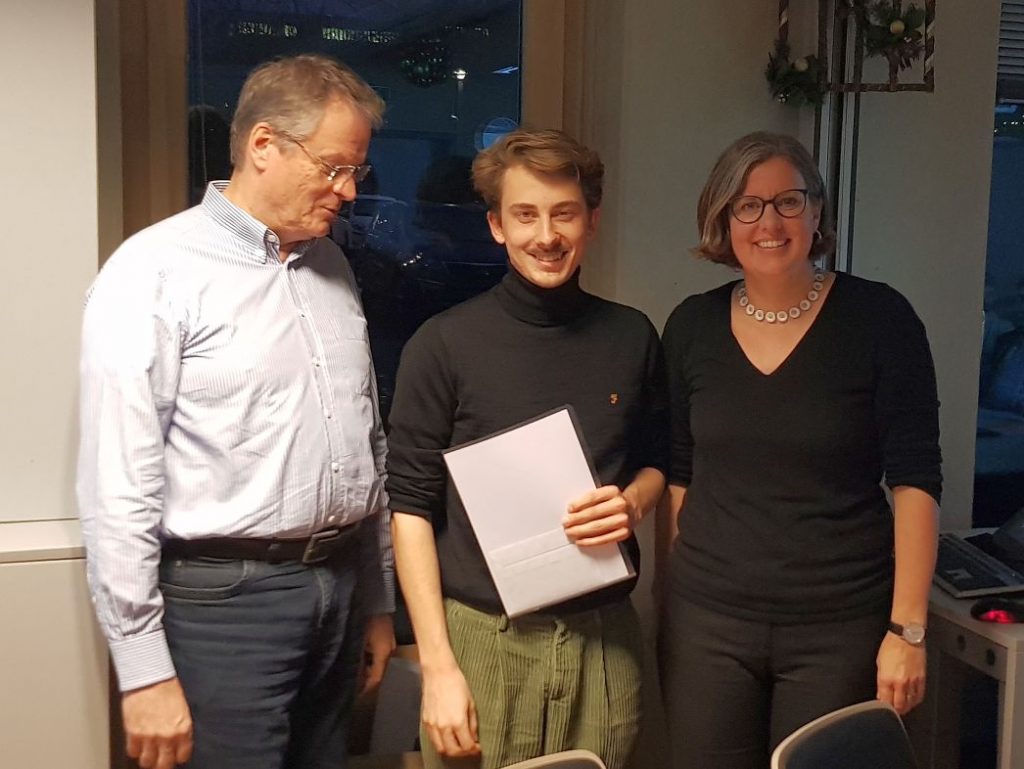
- Lukas Vollmer, Masterarbeit zum Thema „Evaluierung räumlicher Lautsprecherwiedergabeverfahren für Anwendungen mit Hörgeräten / Evaluation of loudspeaker-based spatial audio reproduction methods for hearing aid applications“ im Lehr- und Forschungsgebiet für Medizinische Akustik betreut durch Florian Pausch und Michael Kohnen.
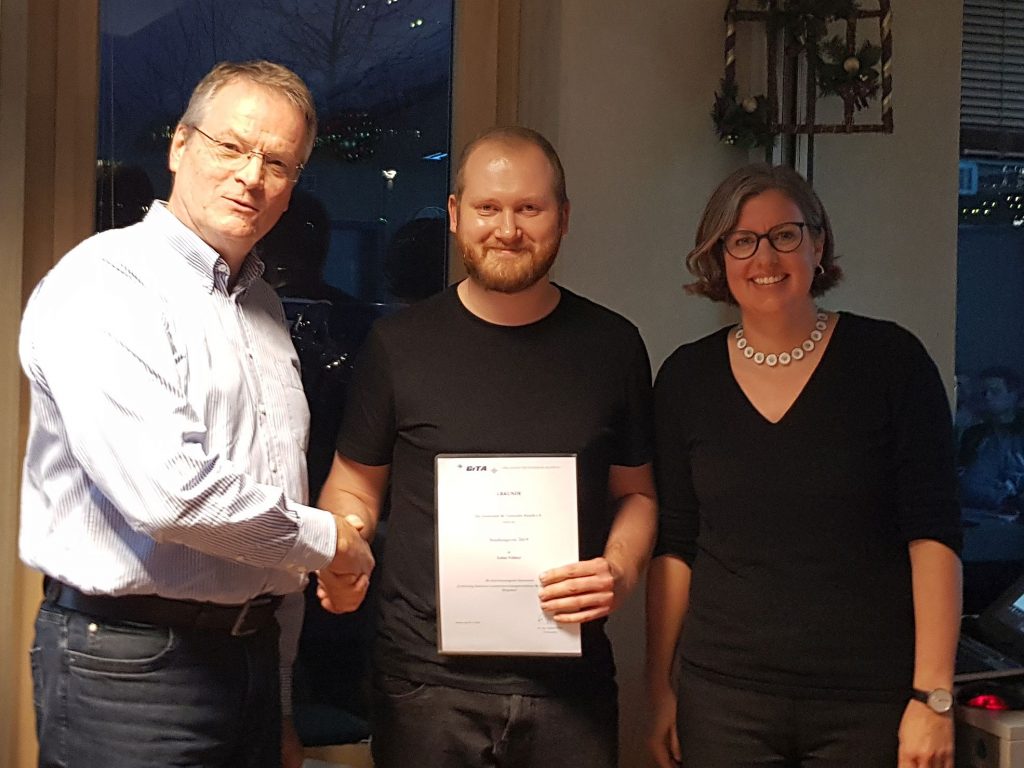
DFG-Fachkollegienwahl 2019: Janina Fels ab Frühjahr 2020 zuständig für das Fach Akustik
Prof. Dr.-Ing. Janina Fels ist – dem vorläufigen Wahlergebnis zufolge – als Fachkollegiatin für das Fach Akustik (Fachkollegium Mechanik und Konstruktiver Maschinenbau) bei der DFG-Fachkollegienwahl für die Amtsperiode von 2020 bis 2023 gewählt worden.
Die Fachkollegien der DFG bewerten die Anträge auf finanzielle Förderung von Forschungsvorhaben. Sie kontrollieren dabei auch die Wahrung einheitlicher Maßstäbe bei der Begutachtung. Zu Fragen der Weiterentwicklung und Ausgestaltung der Förderprogramme der DFG wird ihr Rat gehört. Den konkreten Rahmen für die Arbeit der Fachkollegien setzt die vom Senat der DFG beschlossene Rahmengeschäftsordnung, auf deren Basis sich die 48 Fachkollegien für ihre jeweilige Amtsperiode eine eigene Geschäftsordnung geben und eine Sprecherin oder einen Sprecher, sowie deren Stellvertretung wählen. […]
https://www.dfg.de/dfg_profil/gremien/fachkollegien/index.html
Die Mitglieder der Fachkollegien werden von Wissenschaftlerinnen und Wissenschaftlern nach Maßgabe einer vom Senat zu erlassenden Wahlordnung auf vier Jahre gewählt. Sie sind entsprechend dem Schwerpunkt ihrer wissenschaftlichen Arbeit jeweils einem Fach zugeordnet.
Weitere Informationen bei der
DFG – Deutsche Forschungsgemeinschaft: :
Vorläufiges Wahlergebnis der DFG-Fachkollegienwahl 2019
Leitseite: Fachkollegienwahl 2019
[:en]
Prof. Dr.-Ing. Janina Fels ist – dem vorläufigen Wahlergebnis zufolge – als Fachkollegiatin für das Fach Akustik (Fachkollegium Mechanik und Konstruktiver Maschinenbau) bei der DFG-Fachkollegienwahl für die Amtsperiode von 2020 bis 2023 gewählt worden.
Die Fachkollegien der DFG bewerten die Anträge auf finanzielle Förderung von Forschungsvorhaben. Sie kontrollieren dabei auch die Wahrung einheitlicher Maßstäbe bei der Begutachtung. Zu Fragen der Weiterentwicklung und Ausgestaltung der Förderprogramme der DFG wird ihr Rat gehört. Den konkreten Rahmen für die Arbeit der Fachkollegien setzt die vom Senat der DFG beschlossene Rahmengeschäftsordnung, auf deren Basis sich die 48 Fachkollegien für ihre jeweilige Amtsperiode eine eigene Geschäftsordnung geben und eine Sprecherin oder einen Sprecher, sowie deren Stellvertretung wählen. […]
https://www.dfg.de/dfg_profil/gremien/fachkollegien/index.html
Die Mitglieder der Fachkollegien werden von Wissenschaftlerinnen und Wissenschaftlern nach Maßgabe einer vom Senat zu erlassenden Wahlordnung auf vier Jahre gewählt. Sie sind entsprechend dem Schwerpunkt ihrer wissenschaftlichen Arbeit jeweils einem Fach zugeordnet.
Weitere Informationen bei der
DFG – Deutsche Forschungsgemeinschaft: :
Vorläufiges Wahlergebnis der DFG-Fachkollegienwahl 2019
Leitseite: Fachkollegienwahl 2019
DFG Schwerpunktprogramm AUDICTIVE (SPP 2236) – Call for Proposals
Die offizielle Ausschreibung der DFG wurde in „Information für die Wissenschaft Nr. 45 | 24. Juni 2019″ veröffentlicht.
Priority Programme “Auditory Cognition in Interactive Virtual Environments – AUDICTIVE” (SPP 2236): https://www.dfg.de/foerderung/info_wissenschaft/ausschreibungen/info_wissenschaft_19_45/index.html
Weitere Informationen auf Website des Schwerpunktprogramms AUDICTIVE (SPP2236):
http://www.spp2236-audictive.de
Die Deutsche Forschungsgemeinschaft (DFG) hat im März 2019 14 neue Schwerpunktprogramme (SPP) für das Jahr 2020 (siehePressemitteilung der DFG) eingerichtet. Darunter auch das neue Schwerpunktprogramm „Auditive Kognition in interaktiven virtuellen Umgebungen (AUDICTIVE)“ initiiert von Univ.-Prof. Dr.-Ing. Janina Fels, RWTH Aachen.
Kontakt:
- Koordinatorin: Univ.-Prof. Dr.-Ing. Janina Fels, RWTH Aachen, Lehr- und Forschungsgebiet Medizinische Akustik, Institut für Technische Akustik
weitere Mitglieder des Programmausschusses:
- Univ.-Prof. Dr. Torsten Kuhlen, RWTH Aachen, Fachgruppe Informatik, Lehr- und Forschungsgebiet Virtuelle Realität und Immersive Visualisierung
- Univ.-Prof. Dr. Steven van de Par, Carl von Ossietzky Universität, Department Medizinische Physik und Akustik, Abteilung Medizinische Physik
- Univ.-Prof. Dr.-Ing. Alexander Raake, TU Ilmenau, Institut für Medientechnik, Fachgebiet Audiovisuelle Technik
- Univ.-Prof. Dr. Sabine Schlittmeier, RWTH Aachen, Institut für Psychologie, Lehr- und Forschungsgebiet Psychologie mit dem Schwerpunkt Auditive Kognition
In den letzten Jahren konnten erhebliche Fortschritte beim Verständnis hörbezogener (auditiver) kognitiver Prozesse und Leistungen erreicht werden. Dies gilt von Basisfunktionen wie Wahrnehmung, Aufmerksamkeit und Gedächtnis bis hin zu komplexen Leistungen wie Szenenanalyse und Kommunikation. Dabei wurden gut kontrollierte, einfache Instanzen von virtuellen Umgebungen verwendet.
Die jüngsten Entwicklungen in den Hard- und Softwaretechnologien der audiovisuellen virtuellen Realität (VR) können jetzt zum Verständnis komplexer audiovisueller Szenen beitragen, etwa in akustisch ungünstigen Situationen wie Klassenzimmern, Großraumbüros, Kommunikation zwischen mehreren Personen oder Außenszenarien mit mehreren und sich bewegenden Schallquellen. Auch kann untersucht werden, wie akustische und visuelle Komponenten sowie weitere kontextuelle Faktoren die Fähigkeit zur Interaktion mit der Szene beeinflussen.
Durch die Verknüpfung der Disziplinen Akustik, Kognitionspsychologie und Virtual Reality/Informatik will das Schwerpunktprogramm das Wissen über hörbezogene kognitive Leistungen in realen Szenen erweitern und die Entwicklung „auditiv-kognitiv validierter“ VR-Technologie ermöglichen.
Promotionsprüfung Rhoddy Angel Viveros Muñoz
Am 24. Mai 2019 hat Herr Rhoddy Angel Viveros Muñoz seine mündliche Promotionsprüfung erfolgreich abgeschlossen.
Herr Viveros Muñoz promovierte über das Thema:
“Speech perception in complex acoustic environments – Evaluating moving maskers using virtual acoustics”
Abstract:
Listeners with hearing impairments have difficulties understanding speech in the presence of background noise. Although prosthetic devices like hearing aids may improve the hearing ability, listeners with hearing impairments still complain about their speech perception in the presence of noise. Pure-tone audiometry gives reliable and stable results, but the degree of difficulties in spoken communication cannot be determined. Therefore, speech-in-noise tests measure the hearing impairment in complex scenes and are an integral part of the audiological assessment.
In everyday acoustic environments, listeners often need to resolve speech targets in mixed streams of distracting noise sources. This specific acoustic environment was first described as the „cocktail party“ effect and most research has concentrated on the listener’s ability to understand speech in the presence of another voice or noise, as a masker. Speech reception threshold (SRT) for different spatial positions of the masker(s) as a measure of speech intelligibility has been measured. At the same time, the benefit of the spatial separation between speech target and masker(s), known as spatial release from masking (SRM), was largely investigated. Nevertheless, previous research has been mainly focused on studying only stationary sound sources. However, in real-life listening situations, we are confronted with multiple moving sound sources such as a moving talker or a passing vehicle. In addition, head movements can also lead to moving sources. Thus, the present thesis deals with quantifying the speech perception in noise of moving maskers under different complex acoustic scenarios using virtual acoustics.
In the first part of the thesis, the speech perception with a masker moving both away from the target position and toward the target position was analyzed. From these measures, it was possible to assess the spatial separation benefit of a moving masker. Due to the relevance of spatial separation on intelligibility, several models have been created to predict SRM for stationary maskers. Therefore, this thesis presents a comparative analysis between moving maskers and previous models for stationary maskers to investigate if the models are able to predict SRM of maskers in movement. Due to the results found in this thesis, a new mathematical model to predict SRM for moving maskers is presented.
In real-world scenarios, listeners often move their head to identify the sound source of interest. Thus, this thesis also investigates if listeners use their head movements to maximize the intelligibility in an acoustic scene with a masker in movement. A higher SRT (worse intelligibility) was found with the head movement condition than the without head movement condition. Also, the use of an individual head-related transfer function (HRTF) was evaluated in comparison to an artificial-head HRTF. Results showed significant differences between individual and artificial HRTF, reflecting higher SRTs (worse intelligibility) for artificial HRTF than individual HRTF.
The room acoustics is another relevant factor that affects speech perception in noise. For maskers in movement, an analysis comparing different masker trajectories (circular and radial movements) among different reverberant conditions (anechoic, treated and untreated room) is presented. This analysis was carried out within two groups of subjects: young and elderly normal hearing. For circular and radial movements, the elderly group showed greater difficulties in understanding speech with moving masker than stationary masker.
To summarize, several cases show differences between speech perception in noise with moving maskers than stationary maskers. Therefore, a listening test that presents moving maskers could be relevant in the clinical
assessment of speech perception in noise closer to real situations.
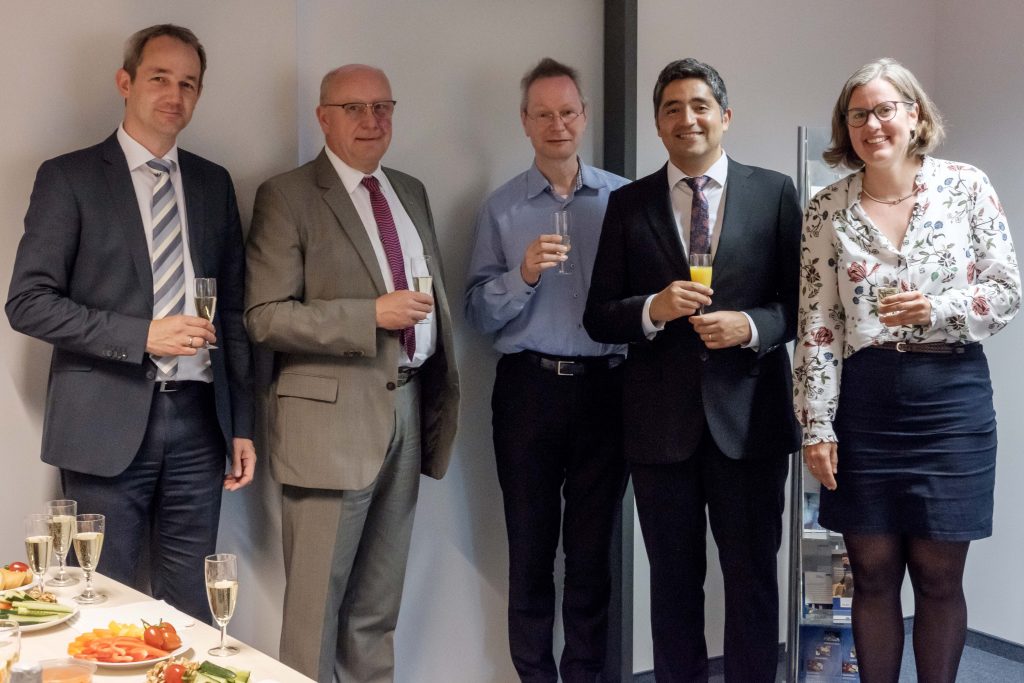
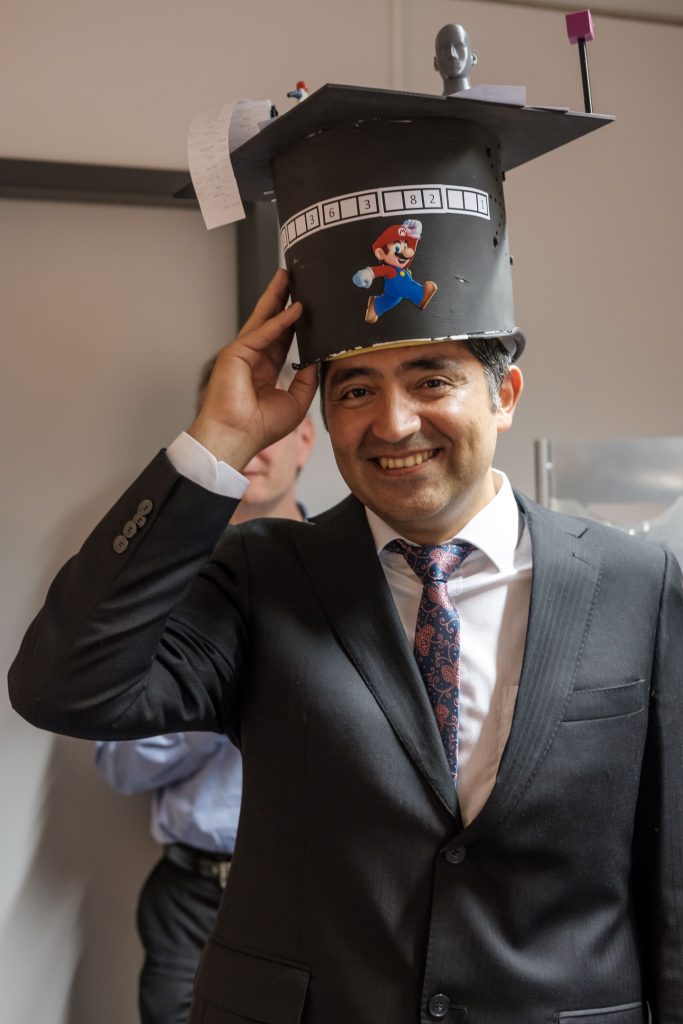
Das ITA gratuliert sehr herzlich!!
Zwei Poster Preise auf der „23rd International Student Conference on Electrical Engineering“ Konferenz „POSTER 2019“ in Prag
Auf der diesjährigen „23rd International Student Conference on Electrical Engineering“ „POSTER 2019“ am 23. Mai 2019 an der Faculty of Electrical Engineering, CTU Prague haben drei Doktorand*innen des Instituts für Technische Akustik teilgenommen.
In der Kategorie „Biomedical Engineering“ haben Saskia Wepner und Shaima’a Doma vom Lehr- und Forschungsgebiet für Medizinische Akustik mit ihren Beiträgen:
- Shaima’a Doma: Towards Subjective Evaluation of Individualized Head-Related Transfer Functions
- Saskia Wepner: Subject Movement During the Measurement of Head-Related Transfer Functions
teilgenommen.
In der Kategorie „Communications“ hat Christian Dreier vom Lehrstuhl für Technische Akustik mit seinem Beitrag „Measurement of Rotational Degrees of Freedom in Vibroacoustic Transfer Functions“ teilgenommen.
-
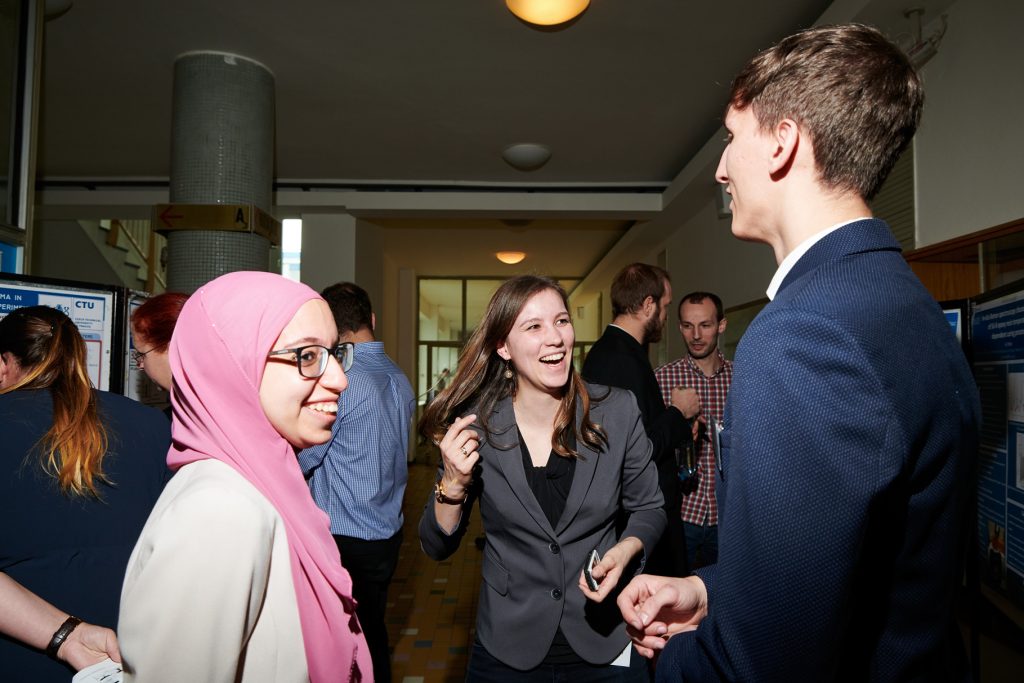
Foto:
Petr Neugebauer (SVTI) – ČVUT FEL -
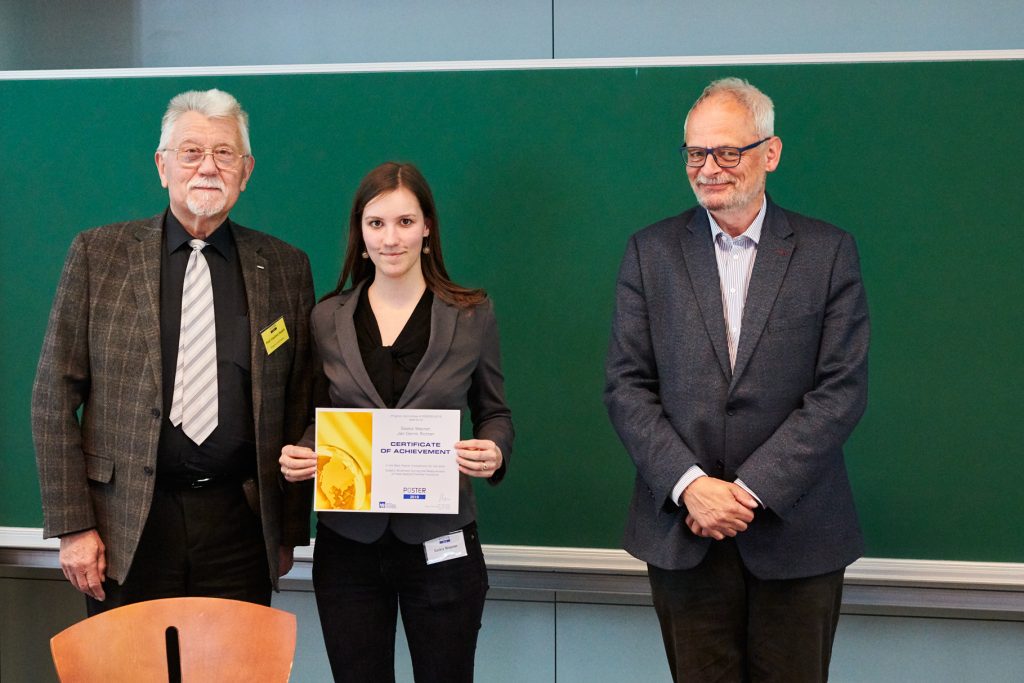
Foto:
Petr Neugebauer (SVTI) – ČVUT FEL -
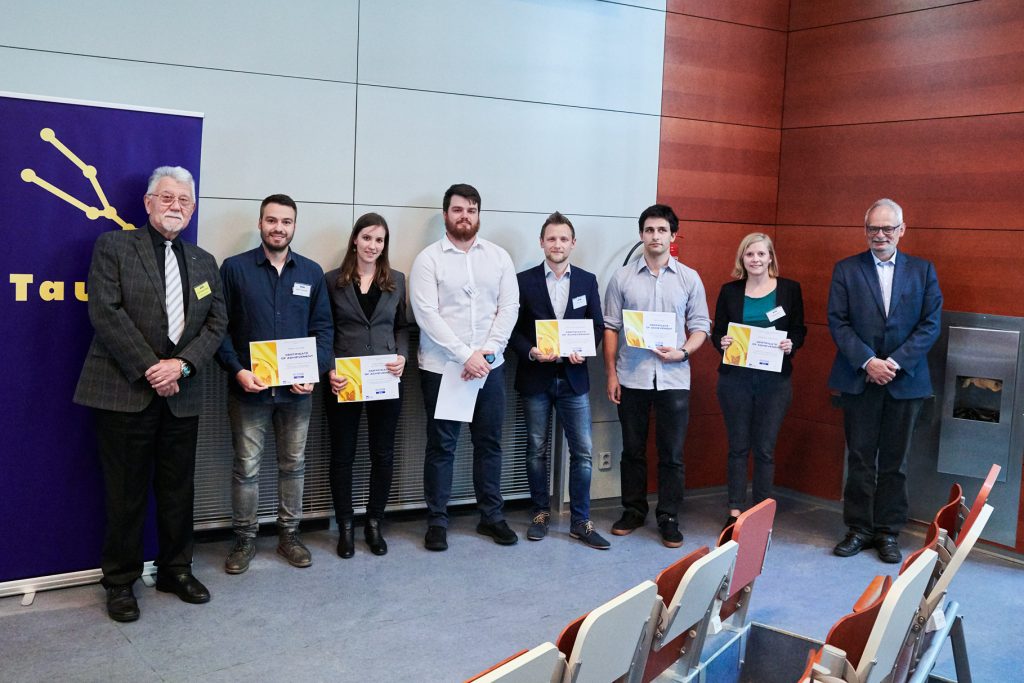
Foto:
Petr Neugebauer (SVTI) – ČVUT FEL -
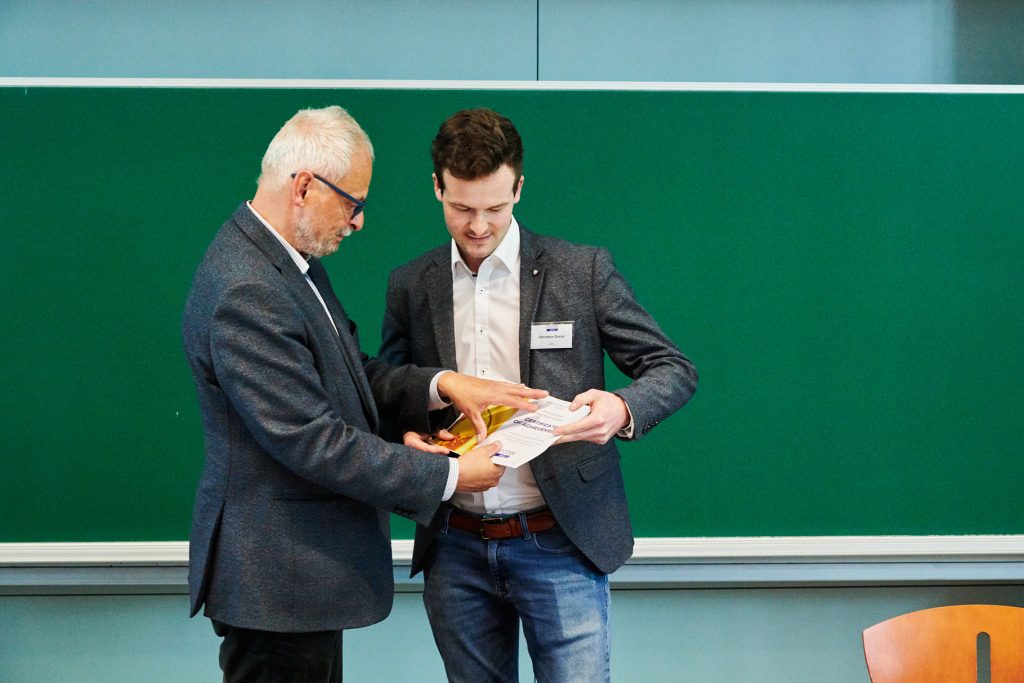
Foto:
Petr Neugebauer (SVTI) – ČVUT FEL -
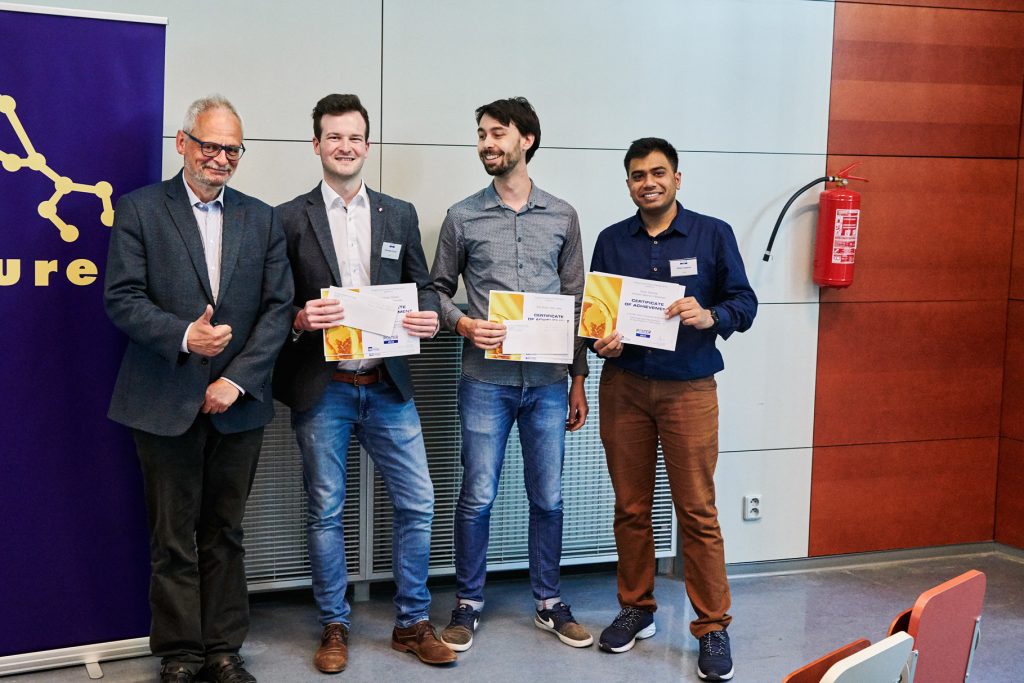
Foto:
Petr Neugebauer (SVTI) – ČVUT FEL
Saskia Wepner und Christian Dreier wurden für ihre Beiträge mit dem 3. (Biomedical Engineering, Saskia Wepner) und 1. Platz (Communications, Christian Dreier) ausgezeichnet.
Herzlichen Glückwunsch!
DFG richtet Schwerpunktprogramm „AUDICTIVE“ ein
DFG richtet 14 neue Schwerpunktprogramme ein
Die Deutsche Forschungsgemeinschaft (DFG) richtet 14 neue Schwerpunktprogramme (SPP) für das Jahr 2020 ein (siehe
Pressemitteilung der DFG). Darunter auch das neue Schwerpunktprogramm „Auditive Kognition in interaktiven virtuellen Umgebungen (AUDICTIVE)“ initiiert von Univ.-Prof. Dr.-Ing. Janina Fels, RWTH Aachen
- Koordinatorin: Univ.-Prof. Dr.-Ing. Janina Fels, RWTH Aachen, Lehr- und Forschungsgebiet Medizinische Akustik, Institut für Technische Akustik
weitere Mitglieder des Programmausschusses:
- Univ.-Prof. Dr. Torsten Kuhlen, RWTH Aachen, Fachgruppe Informatik, Lehr- und Forschungsgebiet Virtuelle Realität und Immersive Visualisierung
- Univ.-Prof. Dr. Steven van de Par, Carl von Ossietzky Universität, Department Medizinische Physik und Akustik, Abteilung Medizinische Physik
- Univ.-Prof. Dr.-Ing. Alexander Raake, TU Ilmenau, Institut für Medientechnik, Fachgebiet Audiovisuelle Technik
- Univ.-Prof. Dr. Sabine Schlittmeier, RWTH Aachen, Institut für Psychologie, Lehr- und Forschungsgebiet Psychologie mit dem Schwerpunkt Auditive Kognition
Zur Pressemitteilung der RWTH Aachen: Pressemitteilung RWTH Aachen
In den letzten Jahren konnten erhebliche Fortschritte beim Verständnis hörbezogener (auditiver) kognitiver Prozesse und Leistungen erreicht werden. Dies gilt von Basisfunktionen wie Wahrnehmung, Aufmerksamkeit und Gedächtnis bis hin zu komplexen Leistungen wie Szenenanalyse und Kommunikation. Dabei wurden gut kontrollierte, einfache Instanzen von virtuellen Umgebungen verwendet.
Die jüngsten Entwicklungen in den Hard- und Softwaretechnologien der audiovisuellen virtuellen Realität (VR) können jetzt zum Verständnis komplexer audiovisueller Szenen beitragen, etwa in akustisch ungünstigen Situationen wie Klassenzimmern, Großraumbüros, Kommunikation zwischen mehreren Personen oder Außenszenarien mit mehreren und sich bewegenden Schallquellen. Auch kann untersucht werden, wie akustische und visuelle Komponenten sowie weitere kontextuelle Faktoren die Fähigkeit zur Interaktion mit der Szene beeinflussen.
Durch die Verknüpfung der Disziplinen Akustik, Kognitionspsychologie und Virtual Reality/Informatik will das Schwerpunktprogramm das Wissen über hörbezogene kognitive Leistungen in realen Szenen erweitern und die Entwicklung „auditiv-kognitiv validierter“ VR-Technologie ermöglichen.
Weitere Informationen unter: https://www.spp2236-audictive.de
Kontakt: Univ.-Prof. Dr.-Ing. Janina Fels


